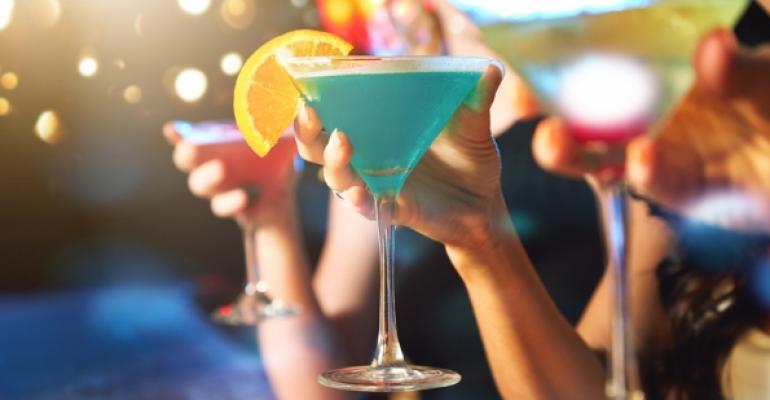In the dynamic world of beverage marketing, there is a constant need to create unique, compelling experiences that keep guests engaged and coming back.
One of the best ways is to promote signature cocktails that forge a lasting connection with the restaurant brand. Unique libations that feature top-shelf spirits, attractive presentations and attention-getting drinkware are viable in virtually any beverage setting — a professional sports event, a guys’ night out at a pub or a fun business dinner with clients.
A group of foodservice executives shared tips for creating vivid experiences at a roundtable discussion during the National Restaurant Association Show in Chicago this year. It was sponsored by Whirley-DrinkWorks!, a designer and manufacturer of custom and collectible drinkware.
Essentially, creating an experience with signature cocktails involves “reading” customers and tailoring beverages which meet their expectations for quality, speed of service and value, roundtable participants agreed.
Impactful experiences are especially important for reaching millennial patrons, says Peter Zilper, vice president of operational excellence and food and beverage for the sports and entertainment division of Aramark, a Philadelphia-based onsite management company.
Millennials, more than baby boomers and Gen Xers, are “more interested in unique experiences” rather than material things, Zilper says.
“So I’m less concerned with creating the next strawberry lemonade margarita with jalapeños than I am around bringing the brand to life in a meaningful way that people want to experience,” says Zilper.
One of the ways that Aramark encourages this is with a concept called Launch Test Kitchen at Quicken Loans Arena in Cleveland and the Las Vegas Convention Center. Launch is a platform for new concept ideas with a frequently changing menu of culinary specialties devised by local chefs in a format with flexible equipment.
“At the flip of a switch, I can completely change out this concept from game to game, event to event,” says Zilper.
Also vouching for the importance of vivid experiences for guests is Stan Frankenthaler, chief officer of food, beverage and strategic supply for CraftWorks Restaurants & Breweries, the Denver-based parent company of the Old Chicago, Gordon Biersch and Rock Bottom chains. “In a full-service restaurant environment, we are really dancing a fine line between speed, service and experience,” Frankenthaler says.
Restaurant servers should size up the customers at the table and gear the service and offerings to fit the experience guests are seeking, Frankenthaler says. For example, a group of men socializing on a restaurant patio might call for fast-paced service of beers or cocktails and small plates of food. In contrast, a dining room occasion with several couples who are friends might revolve around settling in with a round of drinks, more elaborate food and more leisurely service.
It’s up to the server to read the difference between those two types of tables. “The complete experience is about speed; it is about accuracy and expertise, and it is also about really engaging with the guests the way they want to be engaged,” says Frankenthaler.
Switching gears, Jim Doak, vice president of menu and beverage innovation for Houston-based Ignite Restaurant Group, parent of the Joe’s Crab Shack and Brick House Tavern + Tap chains, discussed how “unexpected value” can make an experience compelling.
“Maybe the ingredients are the unexpected value,” says Doak. “Maybe it’s a product that’s the unexpected value. But it’s also the execution of the drink.”
For example, the fun, whimsical, blue-tinged Shark Bite cocktail at Joe’s “gives you a vacation in a glass while you’re sitting on the deck,” Doak says, but the fresh, seasonal Cucumber Southside cocktail sets a more sophisticated tone at Brick House.
The marketers agreed that drinkware is a vital tool in creating compelling experiences. “Glassware is 100 percent a part of it,” says Sean Parisi, formerly director of beverage for Chicago-based Levy Restaurants and now with Constellation Brands. “For us in concessions, the signature drink glass can be the cheapest and most impactful souvenir that the guest may have.”
Testifying to the power of signature drinks in souvenir drinkware, Parisi says the Levy Restaurants concessions at Churchill Downs sold 250,000 Mint Julep and Oaks Lily cocktails in screen-printed, collectible glasses on Kentucky Derby weekend in May.
At CraftWorks, “the right glassware for the right beverage has always been part of our beverage tradition,” says Frankenthaler. In fact, drinkware represents “a tangible, tactile experience in a more and more virtual world.”
Ignite Restaurant Group has a track record of leveraging drinkware to make compelling experiences. “We were one of the first to do Mason jars, and they are still a strong piece for the Joe’s brand,” says Doak. “And having a great copper mug at Brick House for the lineup of [Moscow] Mules absolutely provides a memorable experience.”




